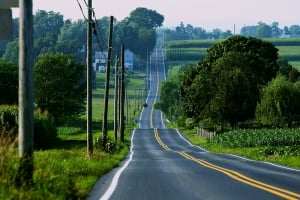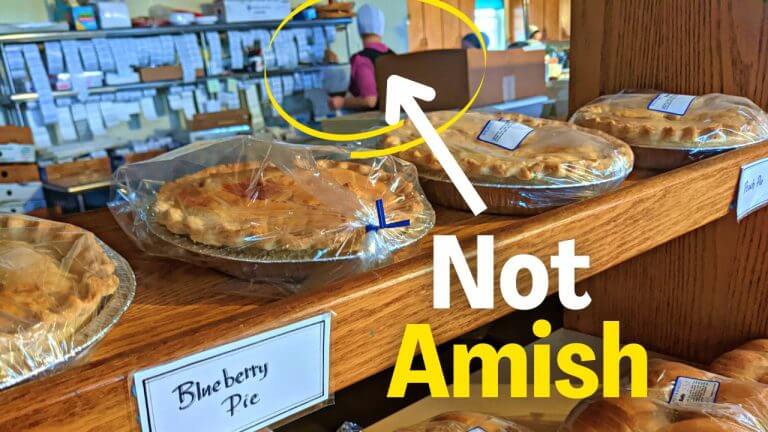A weekend with the Martins
They live about as far back in as you can get, two miles down a mud road, deep in the heart of a serene pine-and-birch forest.
The neighbors are mostly friendly, and Jacob has worked out a deal with one of them–a big-city transplant and a bit ‘unhandy’ when it comes to farming– to manage and use a cow and some of his equipment. It’s not a bad deal at all–extra milk and tractor power for the family.
The Martin family maintains a little island of America in the Varsovian hinterlands. When I walked in the front door on Saturday to greet Anita, as she leaned over the kitchen table processing the remains of a duck, I could feel it right off.
As soon as Anita began speaking, I realized I knew the accent from somewhere. I couldn’t put a finger on it at the time, but later it was obvious. It turns out Anita comes from a Knepp clan in southern Indiana. Anita is warmer and less cautious when you first meet her, but Jacob soon warms as well. He is quite talkative and a pleasure to listen to as he expounds on various topics.
So to get one of the most superficial matters out of the way, how ‘Amish’ are they? Anita’s family is based in an Indiana Beachy Amish congregation. While Jacob was born in Pennsylvania, he soon moved away and spent his childhood and younger years in settlements in Tennessee and Kentucky. And he has the drawl to show for it.
Jacob calls his home congregation ‘Amish Mennonite’, but sees them as being basically aligned with Anita’s Beachy group–or at least they were at the time.
Jacob’s Polish is excellent. Much better than mine. Jacob has a talent for languages and is currently translating a Mennonite-authored book of inspirational stories into Polish. He’s about a third of the way through. Over his nearly fifteen years in Poland, he’s read many of the Polish classics–Sienkiewicz, Mickiewicz, who wrote the great epics, and others.
Jacob’s family left Pennsylvania German behind a couple generations before, he explained, as I sat and listened in one of his imported Amish-style hickory-rockers. Anita used it growing up, says she understands it perfectly, but might have a tough time speaking it. She says she used PA Dutch with the oldest kids for a spell, but abandoned it after a while since Jacob doesn’t speak it himself.
The kids are comfortable using both Polish and English, but the younger ones especially tend to gravitate towards English. (By the way, re-reading my last post I realized I might have gotten a bit ahead of the game and added a kid to the Martins’ total, which currently stands at seven, not eight.)
Those little guys are a joy to be around, especially one and a half-year-old Stefan, and little four-year-old Krzysiek. They are what the Poles might call rozrabiaczki–fun-loving little troublemakers.
Jacob and Anita’s first kids got classic American names–Ruben and Joshua–while later ones received Polish monikers–Ilona, Zofia, Waldek. Jacob says they now follow the formula of a Polish first name and an English middle one–‘Stefan James’–in case they ever return to the States.
There doesn’t seem to be much likelihood of doing that now. Things don’t sit too well back home with the families. The last visit was about three years ago–Anita’s parents. They are civil but fail to see eye-to-eye on various matters.
In any case, this is where home is now. Jacob realizes that with all the media curiosity among Poles, he has a potentially very positive role to play here–one he didn’t ask for, he chuckles, but one he will continue to take on.





I am curious how they were admitted to Poland in the first place. Surely getting a work permit is very difficult. How do they support themselves?
I hope I didn’t over look this in the other articles, do you know why the Martin family left the USA and why they chose Poland to immigrate to?
Beachy Amish in Poland
I am actually not totally sure why they chose Poland–they first came over as part of a small group which included parents and at least one other family, and it was done as a mission through the Beachy church I believe. There are Beachy communities in Romania and Ukraine among other places so perhaps it was just the next country they thought they’d go to. But I actually didn’t get into the question too deeply this time so I have to say I’m not 100% sure.
Missy, Jacob has had a permanent residence card for I think close to five years. He does odd jobs, makes furniture, and they sell dairy products. They are not loaded but live well.
i just wanted to comment for once and say that i LOVE your site. i read it all the time. i’m completely intrigued with the amish and you’re living my dream by, well, living with them!
keep it up, i look forward to all your posts 🙂
Kenzi I just want to say that makes me very happy to hear, thank you. I feel I’ve been blessed and if I can share a little of what I’ve experienced in a respectful way I do so gladly.
I really enjoy writing this blog so I’m glad you enjoy reading it and please feel free to share any other thoughts or comments in future, I love hearing them.
Erik,
The Beachy Amish connection explains a lot. I’m assuming that the Beachy congregation in Southern Indiana is the one in Davies County?
What I’m most curious about, however, is how they ended up aligning themselves with a Pentecostal congregation, instead of being “separate”, a hallmark of anabaptist groups.
Matthew
Hi Matthew, you are right about the location.
I talked with Jacob about this–it’s a bit complicated but one thing is that he says he is more interested in a congregation where the influence of the leader is ‘de-emphasized’, in contrast to say, certain Amish or Catholic congregations, and he feels he found something close to that in this particular Pentecostal group.
Erik,
Jacob’s response is interesting. Perhaps the Pentecostal churches in Poland have less emphasized leadership roles than here in the United States, because, in general (and I do realize I’m painting with a broad brush), Pentecostal Churches here have been actually defined by the charisma of the bishop, pastor, etc. The one exception that I can initially think of would be the snake handling churches in the foothills of the Appalacian mountains.
-Matthew